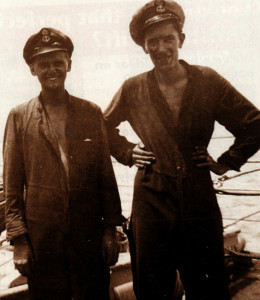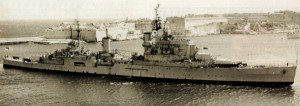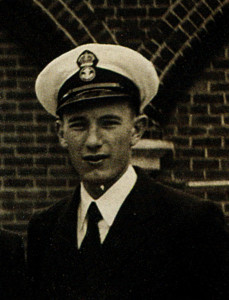
‘FOR young men on a two-year National Service engagement, vacancies exist in the Royal Navy for Engine Room Artificers. They will suit candidates who have served a five-year engineering apprenticeship’.
This was good news. Aged 21 and having been called up in May, 1955, soon after completing my apprenticeship at Southall’s AEC bus company, the announcement appealed -particularly when I discovered that by passing a 44-hour trade test I could enter as a petty officer and be paid £3.10s a week, instead of the standard £1.6s offered to National Servicemen.
Having passed the trade test at Portsmouth Dockyard, I found myself kitted out as a petty officer in full ‘fore and aft rig’, complete with brass buttons and peaked cap. I felt quite the lad.
The short straw
Reality dawned when I was appointed to the Swiftsure Class cruiser HMS Superb and introduced to a hammock -not ideal for someone of 6’4″. After falling out several times I was issued with a camp bed. This would prove an advantage in the Persian Gulf: much to the annoyance of fellow ERAs, I was spared the stifling heat of the mess deck and allowed to sleep above, on the gun deck.
The Admiralty announced that the wives of Royal Navy National Servicemen would receive the full marriage allowance paid to all RN personnel. As I was engaged,
and this would make a nice nest egg with which to start married life, we quickly got the banns read and were married a few weeks before I sailed.
Hot work
Back on board, I was unfortunate enough to be assigned not only to boiler room duties but to the tedious routine of watch keeping. Four hours on and eight hours off, around the clock, was rather unpleasant in tropical heat and seemed particularly gruelling when others around me had been assigned day work on refrigerator or motorboat servicing.

It was pretty oppressive down among the oil-fired furnaces, whose function was to heat water and produce steam to drive the propeller shaft turbines in the engine room. To reduce the monotony, I amused myself by taking the examinations for my ‘boiler room ticket’, which my fellow ERA Derek Youngman and I easily passed with our first-hand knowledge of the job.
Imagine my delight when, with the Navy short of ships, the Admiralty decided that to make room for regular ERAs urgently awaiting seagoing experience, National Service ERAs with a boiler room ticket would be demobbed after 18 months service instead of the normal two years.
Far and away
During those 18 months I visited places I would otherwise never have seen. HMS Superb visited Malta, Suez, Kuwait, Dar
es Salaam, Mombasa, Bahrain and the Seychelles from our base of Trincomalee in Ceylon.
One night, during a short stay in an East African port, I was seconded to the local police as head of a naval patrol in charge of four of our sailors. Together with a police officer and four giant Sikh constables, we were to search for wayward sailors in the local house of ill repute.
Armed with whistles, armbands and short pickaxe handles, we descended in two Jeeps on this notorious establishment. Our Sikh giants wasted no time in knocking the door straight in – crash, bang, wallop! None of our lads was present, but we returned to the ship a much wiser group of young men…
Eddie (right) with fellow ERA Derek Youngman, in 1956.
Back below decks, I was sent to the engine room for a day -my first experience of this department. I had no knowledge of the ship’s complex steam turbine equipment other than what I had read in the manuals. Down in the bowels of the ship, you have no idea what’s going on aloft and your only contact with the bridge is via the engine room telegraph. With this device, the ship’s officers let you know what’s required in the way of engine revolutions, relaying instructions such as start, slow, stop, half ahead, full ahead, half astern and full astern.
All should have been well as we were due to steam gently ahead, but the telegraph jumped to life as the bridge rang down ‘slow’. I knew enough to slow the turbine revs, but wasn’t sure what to do when the bridge signalled ‘stop’, which is what happened next.

I was on my own, but was partly familiar with the procedure required to stop the ship: close the hand wheel controlling the valve on the ‘ahead’ turbine, then crack open the ‘astern’ turbine to reverse the propeller. But how much is ‘crack open’? With difficulty, as it was stuck, I opened the valve to what I thought was a sufficiently small amount.
You can guess what was happening on the bridge as 12,000 tons of cruiser drew alongside the oiling jetty, slowed down, stopped and then began to go backwards. I’d opened the control valve on the ‘astern’ turbine too much, causing pandemonium up above. The next thing I knew, the engine room was full of engineering officers in white boiler suits who quickly pushed me aside and took control.
I thought I was in for trouble when I was summoned to appear before the skipper, but all was forgiven when it was discovered that contrary to standard procedure. I’d been left alone on my first time in the engine room. The meeting
All shipshape, Eddie is pictured having just passed his trade test in july, 1955, at VictoriaI Barracks, Portsmouth.
never took place. In fact, I suspect they thought I did rather well in the circumstances.
My remaining time in the Royal Navy passed in comparative ease. I enjoyed newfound freedom from boiler room duties, which were now eagerly sought after by other National Service ERAs intent on taking the exam for their ‘early demob’ ticket.
It had certainly paid off for me, as by the time hostilities started in Suez, my 18 months was up and I was on the plane home, back to my new wife and the AEC.
Eddie Bennett”, Ruislip, Middlesex








